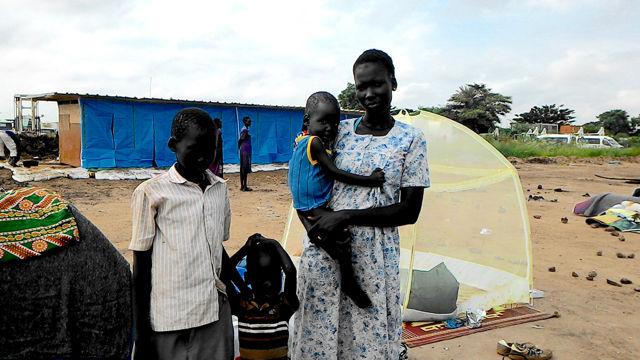
Thousands of people continue to live in United Nations displacement sites in Juba, South Sudan, after fleeing intense battles that first erupted in the city a week ago today. Despite a ceasefire that continues to hold, many are still too frightened to return home.
Maria, a mother of three boys, fled her home a week ago to escape violence that had erupted in her once-safe community. Along with thousands of others, the family made their way to the United Nations Mission in South Sudan in Juba. Now, one week on, she still has no plans to return to her home and waits in worried anticipation of what will happen next.
She sits with 2-year-old Gatbel as he eagerly eats a high-calorie vitamin-fortified food bar provided by UNICEF as part of the emergency response for people caught up in the conflict.
As Gatbel eats, Maria describes how events unfolded overnight in her community – as conflict consumed Juba, the capital city of South Sudan. At home, she heard gunfire and shouts, at a distance, at first, and then moving closer. Her husband came and said they had to leave immediately. The family gathered the boys – 10-year-old Ketch, 4-year-old Begwa and Gatbel.
With whatever they could carry, they made their way through the streets, avoiding areas where gunfire was fiercest. They knew the United Nations compound was near, and that it would be safe. When they made it, Maria finally felt like the worst was over for her and her children.
“We didn’t have food for three days until UNICEF gave us these biscuits. Even I am living on this food,” she says.
UNICEF provided the supplement to all children under 5 who could be reached. “UNICEF took us in, and talked about how to care for our children. We were told to continue to breastfeed our children and were given blankets and drinking water to help us survive,” says Maria.
When the conflict erupted, UNICEF and partners immediately began working to identify children who had lost track of their parents as families fled the violence and to begin the process of reunification.
In the United Nations compound, with food and shelter secured and her family by her side, Maria feels safe. But she does not know what to do next. Even with the temporary ceasefire put into action, she says she dreads the idea of going home.
Before last week’s intense battles in Juba, some 185,000 internally displaced people had been living in United Nations Protection of Civilians sites, while some 90 per cent of internally displaced people had been on the run or sheltering outside these sites. The conflict had first erupted in 2013.
Despite a peace agreement on paper, many people who were caught in the fighting that consumed the city nearly three years ago have again been forced to flee for their lives.
“Camps like this have become a way of life in South Sudan,” says Maria forlornly.
Source: UNICEF
 FR
FR EN
EN AR
AR








